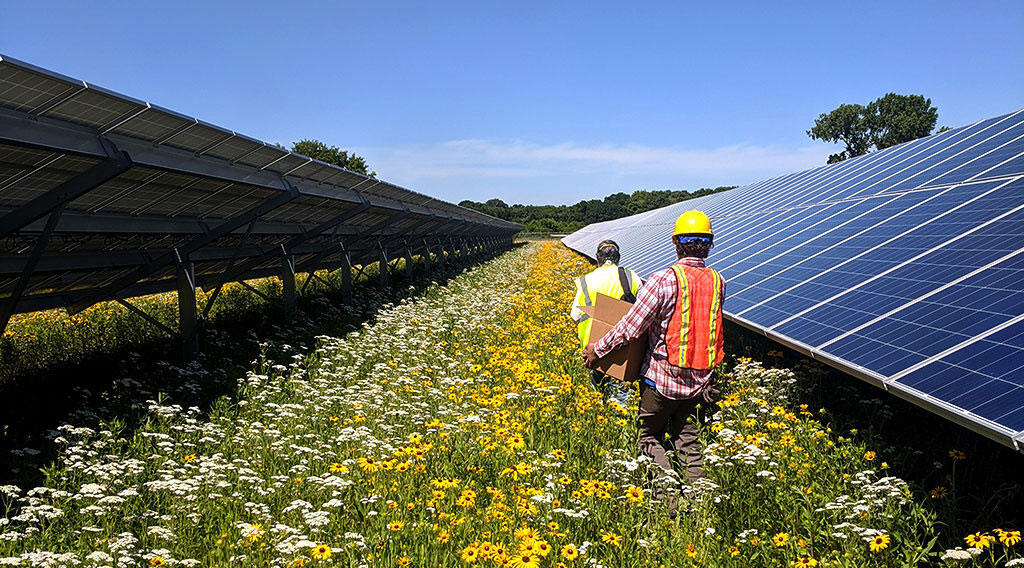
The largest solar farm proposal in the Midwest recently received approval from Wisconsin state regulators. Most of the 3,500-acre Badger Hollow Solar Farm project, which is being developed by Illinois-based Invenergy, is located on active farmland and will include up to 1.2 million solar panels on 2,200 acres of the project area. Some in the community saw the project as a staggering land use change in their community and contrary to the county’s farmland preservation plan. Significant local opposition to the project decried the use of prime agricultural land for solar production.
This case is emblematic of the dilemmas faced by the solar industry, utilities, and those working at the local, state, and federal levels to decarbonize the power sector and increase the use of local renewable energy. The Great Plains Institute is working to address these issues in ways that support solar development and agricultural protection goals. Continue reading »



 Solar energy is not only important to reaching a zero-carbon energy system—solar projects can, with appropriate siting and design, also deliver many benefits to local communities where projects are sited. Deploying the level of solar needed to decarbonize our economy will require addressing siting and regulatory processes which are increasingly a barrier to solar project development. The Great Plains Institute is fostering a new paradigm in the deployment of community- and utility-scale solar development; what we call the co-benefits approach to solar. We’re working with state, regional, and national partners to identify how energy development can both help solve the climate crisis and deliver local benefits to the host community.
Solar energy is not only important to reaching a zero-carbon energy system—solar projects can, with appropriate siting and design, also deliver many benefits to local communities where projects are sited. Deploying the level of solar needed to decarbonize our economy will require addressing siting and regulatory processes which are increasingly a barrier to solar project development. The Great Plains Institute is fostering a new paradigm in the deployment of community- and utility-scale solar development; what we call the co-benefits approach to solar. We’re working with state, regional, and national partners to identify how energy development can both help solve the climate crisis and deliver local benefits to the host community. 
 As part of the Grow Solar Partnership, toolkits have been assembled to equip local governments in Minnesota, Wisconsin, and Illinois with information regarding solar development as it relates to planning, zoning, and permitting. The toolkits were created in 2016, then model ordinances are being updated in 2020 to reflect new best practices and lessons learned since 2016. Minnesota and Iowa are updated and Illinois and Wisconsin are in process, with ordinance for Indiana and Michigan under development. The purpose of these toolkits is to provide resources that will assist communities in addressing barriers to solar energy installations in a manner tailored to each community’s needs.
As part of the Grow Solar Partnership, toolkits have been assembled to equip local governments in Minnesota, Wisconsin, and Illinois with information regarding solar development as it relates to planning, zoning, and permitting. The toolkits were created in 2016, then model ordinances are being updated in 2020 to reflect new best practices and lessons learned since 2016. Minnesota and Iowa are updated and Illinois and Wisconsin are in process, with ordinance for Indiana and Michigan under development. The purpose of these toolkits is to provide resources that will assist communities in addressing barriers to solar energy installations in a manner tailored to each community’s needs.
 More communities than ever are using solar energy thanks in part to a program that makes it easier for local governments to make the switch to sun. The Great Plains Institute (GPI) led the Upper Midwest cohort of communities seeking
More communities than ever are using solar energy thanks in part to a program that makes it easier for local governments to make the switch to sun. The Great Plains Institute (GPI) led the Upper Midwest cohort of communities seeking 
